G.F. Fitz-Gerald - Mouseproof (Reissue) (1970/2006)
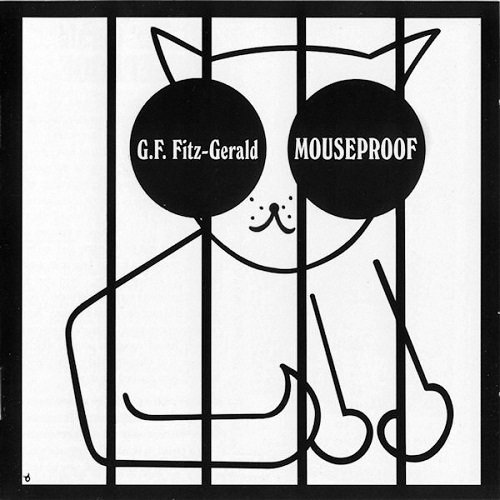
Artist: G.F. Fitz-Gerald
Title: Mouseproof
Year Of Release: 1970/2006
Label: Sunbeam Records
Genre: Psychedelic Rock, Prog Rock
Quality: Mp3 320 / Flac (image, .cue, log)
Total Time: 33:33
Total Size: 97/203 Mb (scans)
WebSite: Album Preview
Title: Mouseproof
Year Of Release: 1970/2006
Label: Sunbeam Records
Genre: Psychedelic Rock, Prog Rock
Quality: Mp3 320 / Flac (image, .cue, log)
Total Time: 33:33
Total Size: 97/203 Mb (scans)
WebSite: Album Preview
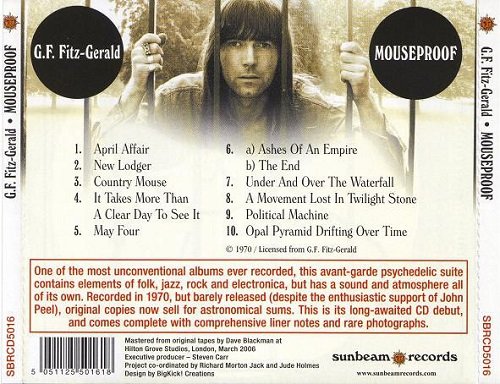
Tracklist:
01. April Affair 05:30
02. New Lodger 01:05
03. Country Mouse 02:42
04. It Takes More Than A Clear Day To See It 00:37
05. May Four 02:57
06. a) Ashes Of An Empire, b) The End 03:56
07. Under And Over The Waterfall 02:39
08. A Movement Lost In Twilight Stone 02:22
09. Political Machine 03:44
10. Opal Pyramid Drifting Over Time 08:03
Line-up:
G.F. Fitz-Gerald - vocals, lead guitar, acoustic guitar, electric banjo, piano, bass guitar, percussion, Moog
Alan Place - vocals & lead guitar on 3
Rod Herman - lead guitar on 1
Brian J. Cole - pedal steel guitar on 3
Judy Dyble - vocals on 6a)
Geoff Leigh - alto, tenor, fluite
Rik Kenton - bass guitar
Ian Andrews - double bass, bass guitar, mellotron, Moog
Sam Gopal - tablas
Ted Tetlon - drums
Tony Turnbull - drums
Almond Valley Peoples' Choir - backing vocals
Although G.F. Fitz-Gerald has been making music since the 1960s, he's issued only one album under his own name, 1970's Mouseproof. This was an era when major labels were more apt to green-light ridiculously uncommercial albums than at any time before or since, and Mouseproof certainly holds its own in that category. While many of the elements of the early-'70s rock underground were present -- pastoral folk-rock, jazzy prog rock thrust, electronic experimentation, twisted approaches to song form and composition, and even a bit of country-rock and minimalism -- not many records combined so many such elements together, both within some of the individual tracks and throughout the record. Indeed, the LP leapfrogged among styles so hectically that it might not have sounded like the work of the same artist to many listeners. Especially considering that most of the songs weren't conventionally accessible in the structural and melodic departments as well, it's not a surprise that it's known to few outside of the psychedelic collecting world.
Raised in Edinburgh, Scotland, Fitz-Gerald played in R&B groups before moving to London, where he ran an electrics business. The multi-instrumentalist continued to play music in sessions and clubs, however, and in the psychedelic group Mouseproof, as well as running a small demo studio. Though Island Records (for whom Fitz-Gerald had done much electrical work) offered Fitz-Gerald a record deal, he signed with a yet bigger company, MCA. Among the musicians accompanying him on Mouseproof were tabla player Sam Gopal, future Roxy Music bassist Rik Kenton, steel guitarist B.J. Cole (who played sessions for several British stars of the period), saxophone and flute player Geoff Leigh (later to work with Henry Cow, Gong, Kevin Ayers, and John Martyn), and original Fairport Convention female singer Judy Dyble.
Unsurprisingly, Mouseproof sold little, although influential British radio DJ John Peel championed it on his show and selected it as his seventh favorite album of the year in Disc. Any prospects it held were also damaged by the failure of the record to come out in the U.S.; according to Fitz-Gerald, this was because MCA refused to put it out in America unless he changed the lyrics to "May Four" (about the 1970 shootings of students at Kent State), which he in turn refused to do. Fitz-Gerald has also said (in the liner notes to the CD reissue of the album) that a disagreement between MCA and its distributor meant that "3000 copies went missing, never to be seen again," leading to it behind impossible to find in stores. Although Fitz-Gerald has continued to perform experimental music since then, he has not released any more albums. Mouseproof became much easier to find when it was reissued on CD by Sunbeam in 2006, with historical liner notes added".
Raised in Edinburgh, Scotland, Fitz-Gerald played in R&B groups before moving to London, where he ran an electrics business. The multi-instrumentalist continued to play music in sessions and clubs, however, and in the psychedelic group Mouseproof, as well as running a small demo studio. Though Island Records (for whom Fitz-Gerald had done much electrical work) offered Fitz-Gerald a record deal, he signed with a yet bigger company, MCA. Among the musicians accompanying him on Mouseproof were tabla player Sam Gopal, future Roxy Music bassist Rik Kenton, steel guitarist B.J. Cole (who played sessions for several British stars of the period), saxophone and flute player Geoff Leigh (later to work with Henry Cow, Gong, Kevin Ayers, and John Martyn), and original Fairport Convention female singer Judy Dyble.
Unsurprisingly, Mouseproof sold little, although influential British radio DJ John Peel championed it on his show and selected it as his seventh favorite album of the year in Disc. Any prospects it held were also damaged by the failure of the record to come out in the U.S.; according to Fitz-Gerald, this was because MCA refused to put it out in America unless he changed the lyrics to "May Four" (about the 1970 shootings of students at Kent State), which he in turn refused to do. Fitz-Gerald has also said (in the liner notes to the CD reissue of the album) that a disagreement between MCA and its distributor meant that "3000 copies went missing, never to be seen again," leading to it behind impossible to find in stores. Although Fitz-Gerald has continued to perform experimental music since then, he has not released any more albums. Mouseproof became much easier to find when it was reissued on CD by Sunbeam in 2006, with historical liner notes added".
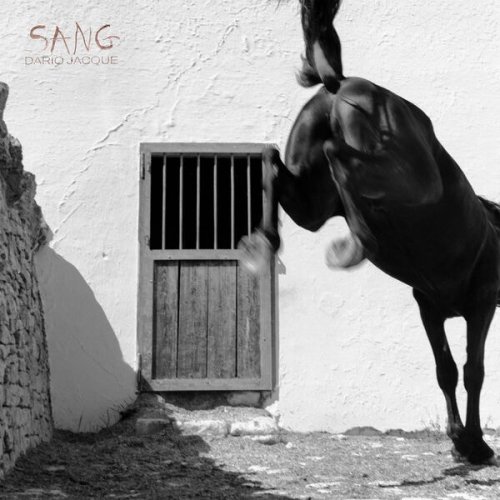
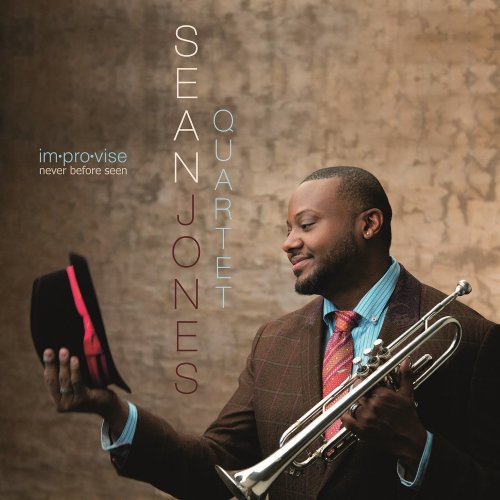
![Malene Mortensen & Christian Sands - Malene & Christian (2026) [Hi-Res] Malene Mortensen & Christian Sands - Malene & Christian (2026) [Hi-Res]](https://www.dibpic.com/uploads/posts/2026-02/1770214038_ye95svxsd11r2_600.jpg)
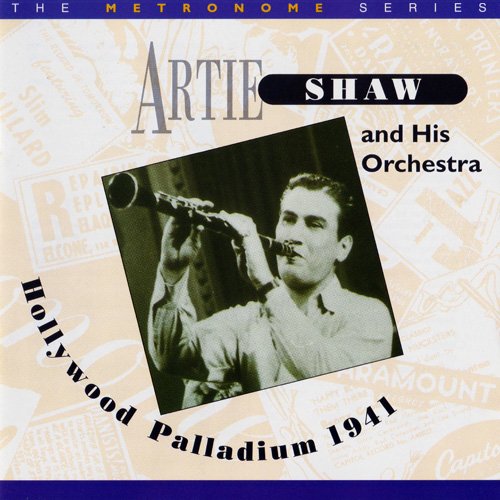
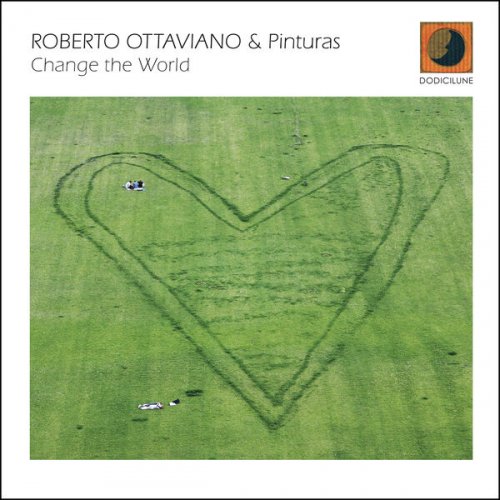
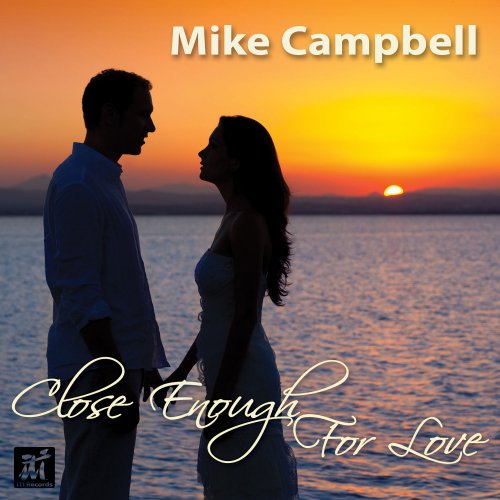
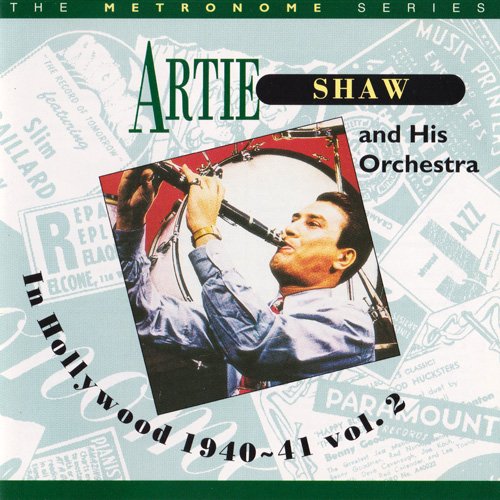
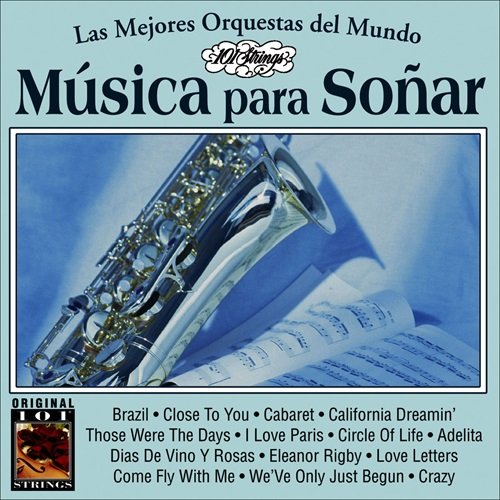
![Ella Fitzgerald, Louis Armstrong - The Complete Ella And Louis On Verve [3CD] (1997) Ella Fitzgerald, Louis Armstrong - The Complete Ella And Louis On Verve [3CD] (1997)](https://www.dibpic.com/uploads/posts/2026-02/1770703124_600.jpg)